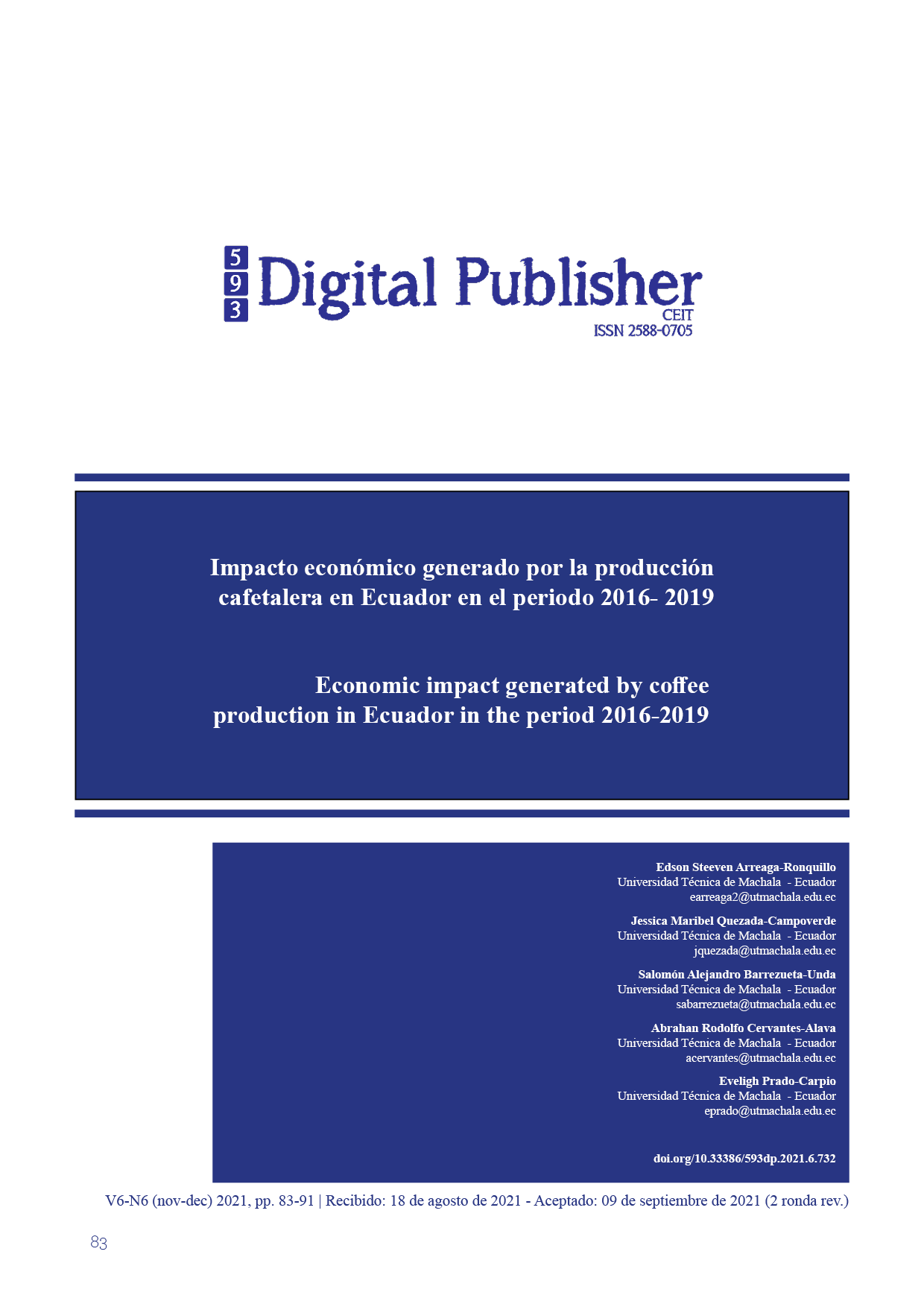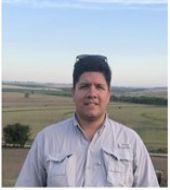Economic impact generated by coffee production in Ecuador in the period 2016-2019
Main Article Content
Abstract
Coffee is one of the fruits with the highest consumption worldwide due to its attractive and romantic flavors. This product at the national level is one of the oldest and most representative in the Ecuadorian economy, since it is considered within export due to the quality with which it is grown. In this sense, the purpose of this research is to determine the economic impact of coffee production in Ecuador during the 2016-2019 periods. In other words, the contribution of this product to the Ecuadorian economy through its commercialization will be analyzed. This study will apply a descriptive documentary type methodology since the information was collected through secondary data obtained from indexed scientific databases and in turn statistical data extracted from official government platforms such as Ministry of Agriculture and Livestock, ProEcuador, National Institute of Statistics and Censuses and the Central Bank of Ecuador, through which it has been possible to obtain that among the contributions that coffee has generated to the national territory, the national economy is better during certain periods, however, due to the lack of innovation among its coffee practices. cultivation has not been able to be used correctly and obtain the expected results.
Downloads
Article Details

This work is licensed under a Creative Commons Attribution-NonCommercial-ShareAlike 4.0 International License.
1. Derechos de autor
Las obras que se publican en 593 Digital Publisher CEIT están sujetas a los siguientes términos:
1.1. 593 Digital Publisher CEIT, conserva los derechos patrimoniales (copyright) de las obras publicadas, favorece y permite la reutilización de las mismas bajo la licencia Licencia Creative Commons 4.0 de Reconocimiento-NoComercial-CompartirIgual 4.0, por lo cual se pueden copiar, usar, difundir, transmitir y exponer públicamente, siempre que:
1.1.a. Se cite la autoría y fuente original de su publicación (revista, editorial, URL).
1.1.b. No se usen para fines comerciales u onerosos.
1.1.c. Se mencione la existencia y especificaciones de esta licencia de uso.
References
Argoti, A., & Belalcazar, N. (2017). El mercado del café en los contextos mundial, nacional y regional. UNIMAR, 35(2), 325-348.
Arias, C., & Prada, J. (2017). La producción cafetera y su impacto en el crecimiento económico del departamento del Huila, Colombia. Ánfora, 24(42), 45-66.
Banco Central del Ecuador. (2019). Exportaciones del Ecuador . Obtenido de https://contenido.bce.fin.ec/documentos/PublicacionesNotas/Catalogo/IEMensual/m1810/m1810_31.htm
Banco Central del Ecuador. (2020). LA ECONOMÍA ECUATORIANA. Obtenido de https://www.bce.fin.ec/index.php/boletines-de-prensa-archivo/item/1383-la-economia-ecuatoriana-decrecio-12-4-en-el-segundo-trimestre-de-2020
Bautista, E., Buendía, P., & Jara, J. (2020). Indicadores macroeconómicos como apoyo para la toma de decisiones. FIPCAEC, 1-5. doi:https://doi.org/10.23857/fipcaec.v5i18.209
Bravo, D., Cobacango, L., Cuétara, L., & García, M. (2019). Perspectiva del valor compartido en la cadena global de valor del café en Manabí. San Gregorio, 1-11. Obtenido de http://scielo.senescyt.gob.ec/scielo.php?script=sci_arttext&pid=S2528-79072019000100001
Espinoza, K., Vásquez, H., Toapanta, M., García, J., Jiménez, J., Chilán, W., & Niño, Z. (2018). VALUACION DEL INJERTO HIPOCOTILEDONAL EN TRES VARIEDADES DE CAFÉ ARABIGO (Coffea arabica L.) A NIVEL DE VIVERO EN EL CANTON CALUMA, PROVINCIA BOLIVAR, ECUADOR. Revista de Investigación Talentos V, 459-467. Obtenido de https://talentos.ueb.edu.ec/index.php/talentos/article/view/115/192
Fernández, Y., Sotto, K., & Vargas, L. (2020). Impactos ambientales de la producción del café, y el aprovechamiento sustentable de los residuos generados. Revista de producción, 15(1), 93-110. Obtenido de http://repository.lasallista.edu.co:8080/ojs/index.php/pl/article/view/2333/210210509
Fórum Cultural del Café. (2020). Origen del café en el Ecuador. Revista del Café, 6-9. Obtenido de https://www.revistaforumcafe.com/el-cafe-en-ecuador
Instituto Nacional de Estadística y Censos. (2019). Estadisticas Sectoriales. Obtenido de https://www.ecuadorencifras.gob.ec/estadisticas-sectoriales/
León, L., Matailo, A., Romero, A., & Portalanza, C. (2020). Ecuador: producción de banano, café y cacao por zonas y su impacto económico 2013-2016. UISRAEL, 7(3), 103-121. Obtenido de https://revista.uisrael.edu.ec/index.php/rcui/article/view/324/171
Ministerio de Agricultura y Ganadería. (27 de Agosto de 2019). Ecuador muestra la calidad de su café, en taller de barismo. Obtenido de https://www.agricultura.gob.ec/ecuador-muestra-la-calidad-de-su-cafe-en-taller-de-barismo/
Ministerio de Agricultura, Ganadería y Pesca. (2017). MAGAP ejecuta “Proyecto de Reactivación de la Caficultura Ecuatoriana”. Obtenido de https://www.agricultura.gob.ec/magap-ejecuta-proyecto-de-reactivacion-de-la-caficultura-ecuatoriana/
Ponce, L., Orellana, K., Acuña, I., Alfonso, J., & Fuentes, T. (2018). Situación de la caficultura ecuatoriana: perspectivas. Estudios del Desarrollo Social: Cuba y América Latina, 307-325. Obtenido de http://scielo.sld.cu/pdf/reds/v6n1/reds15118.pdf
Torres, L., Martínez, K., Serna, J., & Hernández, M. (2019). Secado de Pulpa de Café: Condiciones de Proceso, Modelación Matemática y Efecto sobre Propiedades Fisicoquímicas. Información Tecnológica, 30(2), 189-200. Obtenido de https://scielo.conicyt.cl/pdf/infotec/v30n2/0718-0764-infotec-30-02-00189.pdf
Trujillo, D. (2017). Mobile commerce; una revisión bibliográfica. NOVUM, 7, 59-77. Obtenido de https://revistas.unal.edu.co/index.php/novum/article/view/69425/63790
Valverde, L., Moreno, J., Quijije, K., Castro, A., Merchan, W., & Ortega, J. (2020). Los bioestimulantes: Una innovación en la agricultura para el cultivo del café (Coffea arábiga L). JSARS, 11(1), 18-28. Obtenido de http://www.scielo.org.bo/pdf/jsars/v11n1/v11n1_a03.pdf
Venegas, S., Orellana, D., & Pérez, P. (2018). La realidad Ecuatoriana en la producción de café. Revista Científica Mundo de la Investigación y el Conocimiento, 72-91. Obtenido de https://dialnet.unirioja.es/servlet/articulo?codigo=6732775






